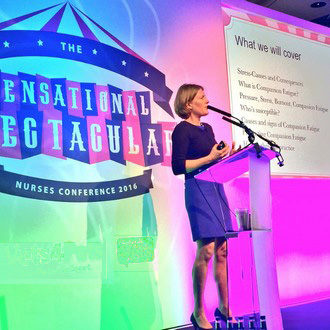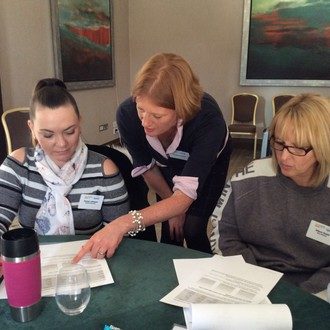Stress is defined as occurring when the demands on a person exceed the personal and social resources that the individual is able to mobilise. To feel ‘stressed’ therefore, two things need to happen:
- You must feel threatened by a situation
- You judge whether your capabilities and resources are sufficient to meet this threat
Both of these responses are entirely personal and subjective, and your perception is key – situations are not inherently stressful, it’s your interpretation of them that drives the level of stress you feel.
We have previously looked at the confidence-competence loop and discovered that confidence comes from competence, just as being good at something makes you feel good about doing it. But even better, we can get the same boost to our self-confidence with a little cheat – simply by acting confident we can generate trust from others and prove to our doubting inner self that we can actually do it. So how can you wing it sufficiently well to convince not only your colleagues and clients, but also your harshest critic, you?
1. Watch your posture
Research at Harvard and Columbia Business Schools found that holding the body in expansive, strong poses stimulates higher levels of testosterone (the hormone linked to power and dominance) and lowers levels of the stress hormone cortisol. So before you go into a situation in which you want to appear confident, stand up straight, pull your shoulders back, widen your stance, hold your head high and put your hands on your hips. It really does work, as this TED talk illustrates beautifully.
2. Use positive affirmations
Another simple, but highly effective technique to boost confidence is positive affirmation. Think about the situations that stress you and try to identify the underlying reason – it might be a perceived lack of training or experience, feelings of inadequacy compared
with colleagues, or worry about the reactions of a difficult client. Create and use a list of positive statements that address and truthfully contradict your fears, for example:
- I am well-qualified, I have undertaken specific training for this task
- My work is resulting in a better quality of life for this patient
- My opinion is valued by the team
- I am successful
Positive affirmations work best when they are:
- Framed in the present tense
- Repeated – recite them several times a day, especially when you begin to experience a negative thought or behaviour. Set a reminder in your phone so your affirmations pop up on screen throughout the day
- Said with feeling – choose a phrase that’s meaningful to you, you must want this change to happen
3. Put things into perspective
Personal growth comes as much from failure as it does from success, so try to view every situation as a learning experience. The US Army is credited with first developing the concept of the After Action Review (AAR), and this process helps ensure no sub-standard client conversation, disappointing appraisal or unproductive meeting goes to waste. Ask yourself:
- What was the desired outcome?
- What was the actual outcome?
- Why were there differences between what I wanted and what I achieved?
- What did I learn?
- What would I do differently next time?
Once you realise that it’s actually very difficult to truly fail, your inner voice will be kinder and you’ll be more confident to push yourself forward.
Because it’s not what you are that’s holding you back, it’s what you think you are not.
If you would like to take control of your life and career, my online personal development programme MyLifeStrategy can help you to overcome the personal and professional challenges you face on a daily basis and learn practical skills and techniques to make a real difference to you and your life.
I’ve developed the Thriving Under Pressure module to help you to understand how you currently respond to the stressors in your life, the difference between pressure and stress and give you tools and techniques you can use to put yourself back in control, overcome the stressors and thrive under the pressures you face. And the Develop Your Confidence module will really help you to look at ways to change your behaviour and create the building blocks for a more confident you.








